The identical twins with autism forging a career in farming
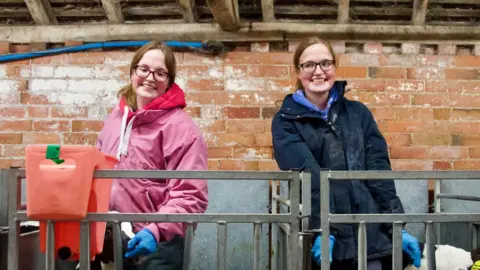 BBC
BBCIdentical twins Laura and Anna Callwood were eight years old when they decided to follow their father into dairy farming. Now aged 20, they've overcome several hurdles connected to their autism to land their dream jobs.
Anna Callwood will never forget the withering reply from a teacher she had excitedly told about the career she had dreamed of since being a child.
"She said 'there's more to life than farming'," recalls Anna, who was a teenager and tirelessly training a heifer for a much-anticipated show.
She went home and told her mum. "She said to me: 'You can do whatever you want'.
"It made me more determined than ever to try and go into farming."
Determination is what drives the Callwood twins. Diagnosed with autism at 10 years old, they have faced a string of educational challenges. Their persistence, however, is unwavering - between them they took a total of 20 driving theory tests before passing, for example.
"Everything always takes a bit longer but they always get there in the end," says their father Andy.
He has watched their obsession with farming intensify since they were little girls growing up in Cleobury Mortimer in Shropshire.
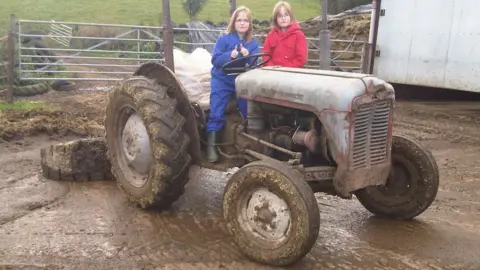 Andy Callwood
Andy CallwoodWhile most children would be fixated by the latest toy, Laura and Anna preferred to help Andy in his job as a dairy farmer at a farm in Staffordshire.
"It was always the bribe - 'if you want to go and help your dad, you've got to do this'," he says.
"I can see them now in their little overalls and little wellies waiting for dad so they could line up the buckets.
"I think they loved the routine, a lot of kids would get bored but they absolutely loved it."
Laura remembers clearly when they decided to follow in their father's footsteps.
"When we were in primary school we showed our first calf at a show and we just got the bug from there," she recalls.
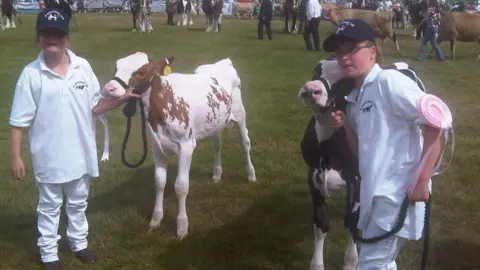 Andy Callwood
Andy CallwoodThe girls were born six weeks early in 1999 at Alexandra Hospital in Redditch. The pregnancy had not been an easy one for their mother, Sarah, who was prescribed the epilepsy drug Epilim Chrono.
Years later, studies found tens of thousands of children born to women taking the medication had disabilities including autism.
As youngsters, the girls developed strong characters. Neither coped well with sudden changes to their routines. They refused to wear each other's clothes, and were resolute to their chosen favourite colours, Anna always in blue, Laura preferring pink.
Their behaviour could be challenging at times. After a day of sitting in hours of lessons they neither enjoyed nor coped well with, they would be "fizzing like a bottle of pop" at home time, Mr Callwood recalls.
After school they would be taken to their dad's work to see the cows they had begun to see almost like family.
"As soon as they were with the cows you'd see all their troubles dissolve," he says.
It was a conversation with a social worker when they were 10 that made everything begin to fall into place.
"She said, 'I think they're on the autistic spectrum'. It was like a light bulb moment," says their father.
"We'd put so much in place for them, coping mechanisms and such... it all suddenly made sense."
With the help of teaching assistants, they got the educational support they needed.
Out of school, their passion continued to flourish as they helped their father at work during the week, and taking part in shows at weekends.
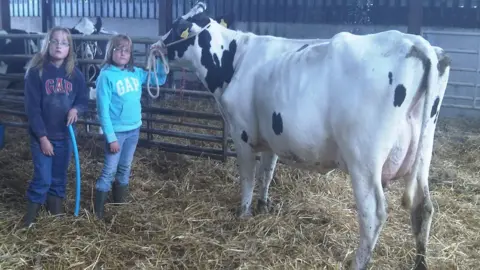 Andy Callwood
Andy CallwoodIgnoring the teacher's barbed comment, they both won places at Hartpury College in Gloucester where they studied for an NVQ in agriculture.
"At college we found the practical side of it was more our cup of tea than the theory bit," recalls Laura.
"We don't like the paperwork, we know we have to do it but we'd just rather go out and spend some time with the calves."
They passed - but their driving test stood in their way of work.
The first instructor had little faith and suggested learning in an automatic.
"I said no chance - you can't drive an automatic and work on a farm," says Mr Callwood.
Their second instructor was more positive and said "It might take them a little longer but they'll pass".
In the end, it took two years, with Laura passing the theory test first, and Anna passing the practical test before her sister.
The girls, who are both active members of Worcestershire Young Farmers, have worked at dairy farms in the Midlands, and their father is grateful to their employers.
 Andy Callwood
Andy Callwood"In their jobs - the girls need empathy... just understanding them and their need for routine. Don't change it - or let them know in advance," he says.
They can expect to work 50-60 hours a week, diligently feeding the calves throughout the day.
"I love it - it's my get up and go in the morning," says Anna, who is currently working at a farm in Worcestershire.
"If a calf or a cow is ill, I get really upset because they have feelings and it breaks your heart."
The girls' memories are such that they can remember not only which calf was born to which cow but also who their grandparents are.
"We have a better connection with cows rather than people... they don't talk back to us, they're just great to work with," says Laura.
"They know how you feel - they've got feelings."
Anna agrees. "They're our passion and they always will be."
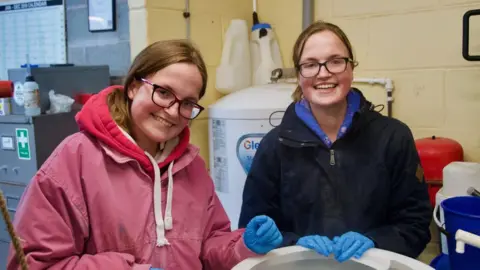

Follow BBC West Midlands on Facebook, on Twitter, and sign up for local news updates direct to your phone.
